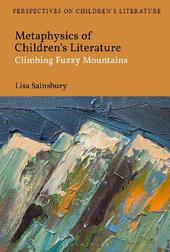
|
Metaphysics of Children's Literature: Climbing Fuzzy Mountains
Hardback
Main Details
Description
Metaphysics of Children's Literature is the first sustained study of ways in which children's literature confronts metaphysical questions about reality and the nature of what there is in the world. In its exploration of something and nothing, this book identifies a number of metaphysical structures in texts for young people-such as the ontological exchange or nowhere in extremis-demonstrating that their entanglement with the workings of reality is unique to the conditions of children's literature. Drawing on contemporary children's literature discourse and metaphysicians from Heidegger and Levinas, to Bachelard, Sartre and Haraway, Lisa Sainsbury reveals the metaphysical groundwork of children's literature. Authors and illustrators covered include: Allan and Janet Ahlberg, Mac Barnett, Ron Brooks, Peter Brown, Lewis Carroll, Eoin Colfer, Gary Crew, Roald Dahl, Roddy Doyle, Imme Dros, Sarah Ellis, Mem Fox, Zana Fraillon, Libby Gleeson, Kenneth Grahame, Armin Greder, Sonya Hartnett, Tana Hoban, Judy Horacek, Tove Jansson, Oliver Jeffers, Jon Klassen, Elaine Konigsburg, Norman Lindsay, Geraldine McCaughrean, Robert Macfarlane, Jackie Morris, Edith Nesbit, Mary Norton, Jill Paton Walsh, Philippa Pearce, Ivan Southall, William Steig, Shaun Tan, Tarjei Vesaas, David Wiesner, Margaret Wild, Jacqueline Woodson and many others.
Author Biography
Lisa Sainsbury is Director of the National Centre for Research in Children's Literature, University of Roehampton, UK.
ReviewsLike Moomintroll and Sniff, readers will climb fuzzy lonely mountains to encounter an eclectic range of texts that represent through figurative language and/or evocative illustrations ways of being and might contemplate their own encounters with self and others somewhere between nowhere and nothingness - and they will be enriched by the journey. * English Studies * In this brilliant new book, Lisa Sainsbury doesn't just think about metaphysics and children's literature; rather, through virtuoso readings of both philosophical and literary texts, she shows how children's literature is always already preoccupied with pressing matters of being and reality. It is just as foundational to our philosophical navigation of the world as to our emotional or psychological development. A deeply informed and exciting study, one that should be required reading for anyone in children's literature or even childhood studies. Highly recommended. * Professor Kenneth Kidd, University of Florida, USA *
|